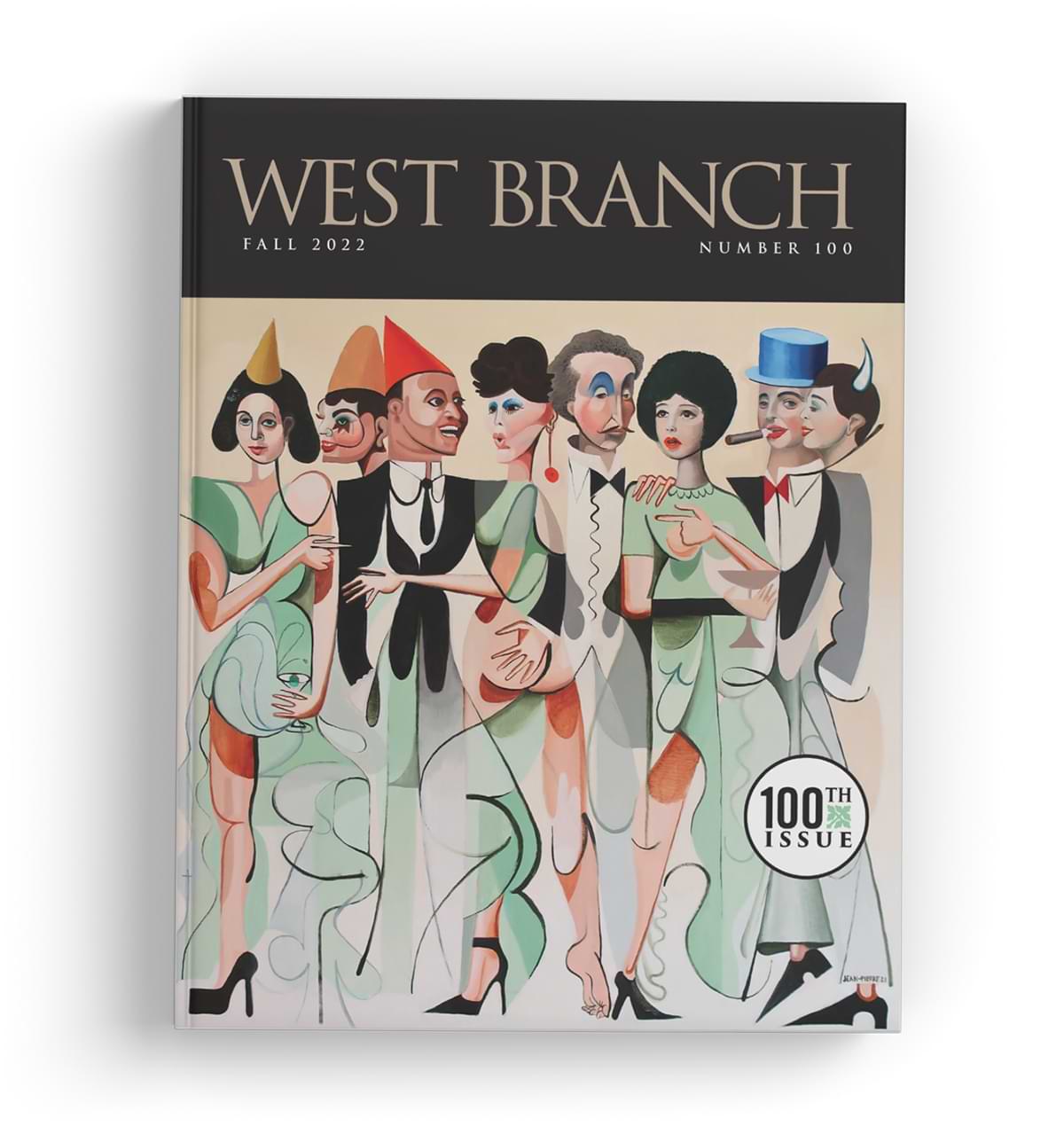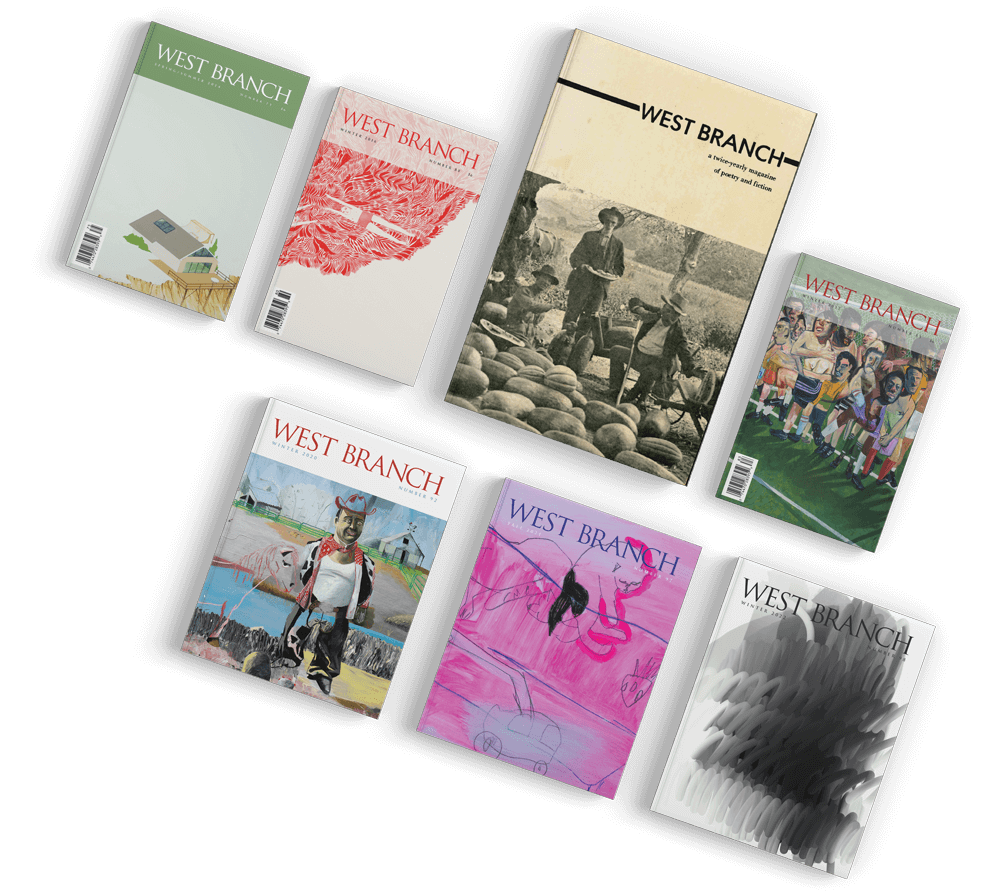More Than A Magazine

Cover images courtesy of West Branch

o mark a significant milestone — the publication of its 100th issue — the editors of West Branch, Bucknell’s professional literary journal, considered taking a unique approach. Perhaps they should establish a thematic thread that would run through each poem, short story, essay and review. Or perhaps they should honor the esteemed writers and editors of previous eras by curating a sampling of their works into a special anthology.
In the end, West Branch editors decided the 100th edition shouldn’t deviate from what the publication has done so well over its 45-year history — present a collection of beautifully written pieces that convey diverse ideas from a variety of perspectives with artistic flair. From a short story about unrequited love and heartbreak to a poem eulogizing the life of a honeybee, to an essay examining the author’s fixation with George Harrison’s “My Sweet Lord,” the fall issue of West Branch is a collection of expansive, compelling literary writing.
West Branch was cofounded in 1977 by co-editors and Professors of English Robert Love Taylor and Karl Patten as a semi-annual publication. In 1988, when Bucknell’s Stadler Center for Poetry & Literary Arts was established to support writers and foster an appreciation for the literary arts, West Branch became integral to the Center’s mission. Eventually, the publication increased frequency to three times a year and launched a companion digital edition.
“Back when West Branch was founded, literary publishing was dominated by big quarterlies that featured well-established authors,” says Andrew Ciotola M’06, managing editor. “In part, Bob and Karl wanted to carve out a place for emerging writers. Originally, the magazine had a regional focus, featuring authors from Pennsylvania and the greater Mid-Atlantic, though it has always welcomed submissions from farther afield.”
Over time, however, West Branch developed a reputation for its high-caliber writing — nurtured by its skillful editors — which sparked broader interest. Submissions arrived from across the country — and the world. English-speaking writers from as far as the British Isles, Australia, India, Nigeria, South Africa and beyond vied for consideration. “West Branch has always had this fly-under-the-radar reputation here at Bucknell,” Ciotola says, “but it’s very well known in the national literary community.”



West Branch’s following — and selectiveness — have continued to grow. The editorial staff, which is led by Professor Joseph Scapellato, English, receives well over 5,000 submissions per year, and less than 1% of those are accepted for publication. The winter 2023 edition features poems translated from Chinese, Vietnamese and Italian.
“For me, a literary magazine is a portal to the public,” Scapellato says. “It generates a community — of contributors, readers and staff members — and because its very existence relies on submissions of creative work from the public, it is generated by a community too. I love reading the poetry, fiction and nonfiction that is submitted to us and discussing that work with fellow editors. It’s a joy, an honor and a privilege to contribute to the greater literary ecosystem in this way.”
One of the measures of success for a literary magazine is how many of its works are selected to appear in the Best American series (Best American Short Stories and Best American Essays, among other spinoffs). Stories, poems and fiction first published in West Branch regularly appear in these prestigious anthologies, which claim to represent the best of contemporary American literary writing.
Even with its popularity and accolades, West Branch is still at its core a publication that helps new writers develop their craft and gain exposure.
“There are a lot of writers who have become influential in the American literary community who published their early work in West Branch,” says Ciotola, who cites Billy Collins, Roxane Gay, Ottessa Moshfegh, and Matthew Salesses among those contributors who are now celebrated writers. “That really is something that we’re proud of and something that we strive for — to be the place that emerging writers want to publish, because they’re doing the most exciting work as far as I’m concerned. Emerging writers are the future of American literature.”
West Branch is also known for developing the next generation of editors and publishing professionals. In 2001, Ciotola started an internship program, which enables two or three Bucknell students each semester to have a hands-on role with the magazine, from evaluating manuscripts to participating in editorial discussions. Many interns graduate into successful careers in the literary world.
“West Branch was a wonderful experience that gave me the chance to be a part of a literary journal at a professional level,” says Janine Hauber Le ’09, an English — creative writing major who now runs her own literary agency. “My favorite part was the editorial meetings, where interns and staff all discussed the submissions that showed the most merit. I loved advocating for my favorite pieces, which led to my career — now, I advocate for authors and illustrators.”
Those who have made up past mastheads — editors, writers and interns — have carried forward West Branch’s tradition of excellence and built a strong foundation for its future. In an era when many print publications are reducing frequency or going entirely digital, Ciotola feels there is value in preserving West Branch’s original format. “Digital reading is affecting the way artists produce,” he says. “We’re seeing shorter and shorter short stories. Micro fiction or flash fiction is a big deal these days. But I think people still appreciate holding a book or a beautiful magazine in their hands. This is a certain type of reading — the reading you do before bed, or sitting by the pool in the summertime, or relaxing in an easy chair at home enjoying downtime. I think our culture still wants to read and experience physical books. That may not always be the case — but I think it still is now.”
